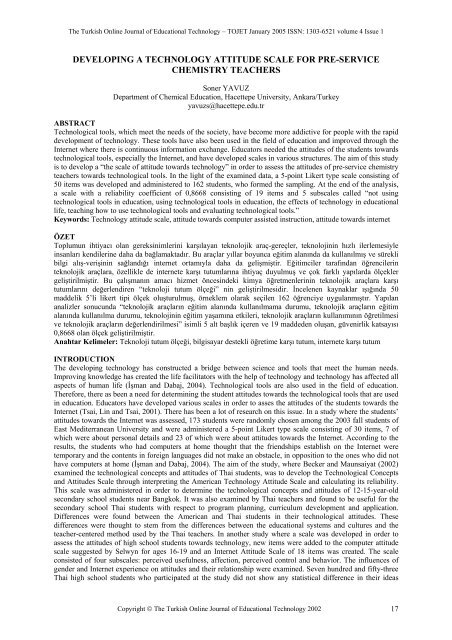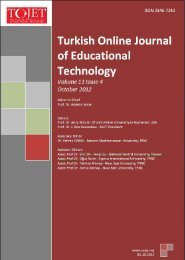Age - TOJET the Turkish online journal of educational technology
Age - TOJET the Turkish online journal of educational technology
Age - TOJET the Turkish online journal of educational technology
Create successful ePaper yourself
Turn your PDF publications into a flip-book with our unique Google optimized e-Paper software.
The <strong>Turkish</strong> Online Journal <strong>of</strong> Educational Technology – <strong>TOJET</strong> January 2005 ISSN: 1303-6521 volume 4 Issue 1<br />
DEVELOPING A TECHNOLOGY ATTITUDE SCALE FOR PRE-SERVICE<br />
CHEMISTRY TEACHERS<br />
Soner YAVUZ<br />
Department <strong>of</strong> Chemical Education, Hacettepe University, Ankara/Turkey<br />
yavuzs@hacettepe.edu.tr<br />
ABSTRACT<br />
Technological tools, which meet <strong>the</strong> needs <strong>of</strong> <strong>the</strong> society, have become more addictive for people with <strong>the</strong> rapid<br />
development <strong>of</strong> <strong>technology</strong>. These tools have also been used in <strong>the</strong> field <strong>of</strong> education and improved through <strong>the</strong><br />
Internet where <strong>the</strong>re is continuous information exchange. Educators needed <strong>the</strong> attitudes <strong>of</strong> <strong>the</strong> students towards<br />
technological tools, especially <strong>the</strong> Internet, and have developed scales in various structures. The aim <strong>of</strong> this study<br />
is to develop a “<strong>the</strong> scale <strong>of</strong> attitude towards <strong>technology</strong>” in order to assess <strong>the</strong> attitudes <strong>of</strong> pre-service chemistry<br />
teachers towards technological tools. In <strong>the</strong> light <strong>of</strong> <strong>the</strong> examined data, a 5-point Likert type scale consisting <strong>of</strong><br />
50 items was developed and administered to 162 students, who formed <strong>the</strong> sampling. At <strong>the</strong> end <strong>of</strong> <strong>the</strong> analysis,<br />
a scale with a reliability coefficient <strong>of</strong> 0,8668 consisting <strong>of</strong> 19 items and 5 subscales called “not using<br />
technological tools in education, using technological tools in education, <strong>the</strong> effects <strong>of</strong> <strong>technology</strong> in <strong>educational</strong><br />
life, teaching how to use technological tools and evaluating technological tools.”<br />
Keywords: Technology attitude scale, attitude towards computer assisted instruction, attitude towards internet<br />
ÖZET<br />
Toplumun ihtiyacı olan gereksinimlerini karşılayan teknolojik araç-gereçler, teknolojinin hızlı ilerlemesiyle<br />
insanları kendilerine daha da bağlamaktadır. Bu araçlar yıllar boyunca eğitim alanında da kullanılmış ve sürekli<br />
bilgi alış-verişinin sağlandığı internet ortamıyla daha da gelişmiştir. Eğitimciler tarafından öğrencilerin<br />
teknolojik araçlara, özellikle de internete karşı tutumlarına ihtiyaç duyulmuş ve çok farklı yapılarda ölçekler<br />
geliştirilmiştir. Bu çalışmanın amacı hizmet öncesindeki kimya öğretmenlerinin teknolojik araçlara karşı<br />
tutumlarını değerlendiren “teknoloji tutum ölçeği” nin geliştirilmesidir. İncelenen kaynaklar ışığında 50<br />
maddelik 5’li likert tipi ölçek oluşturulmuş, örneklem olarak seçilen 162 öğrenciye uygulanmıştır. Yapılan<br />
analizler sonucunda “teknolojik araçların eğitim alanında kullanılmama durumu, teknolojik araçların eğitim<br />
alanında kullanılma durumu, teknolojinin eğitim yaşamına etkileri, teknolojik araçların kullanımının öğretilmesi<br />
ve teknolojik araçların değerlendirilmesi” isimli 5 alt başlık içeren ve 19 maddeden oluşan, güvenirlik katsayısı<br />
0,8668 olan ölçek geliştirilmiştir.<br />
Anahtar Kelimeler: Teknoloji tutum ölçeği, bilgisayar destekli öğretime karşı tutum, internete karşı tutum<br />
INTRODUCTION<br />
The developing <strong>technology</strong> has constructed a bridge between science and tools that meet <strong>the</strong> human needs.<br />
Improving knowledge has created <strong>the</strong> life facilitators with <strong>the</strong> help <strong>of</strong> <strong>technology</strong> and <strong>technology</strong> has affected all<br />
aspects <strong>of</strong> human life (İşman and Dabaj, 2004). Technological tools are also used in <strong>the</strong> field <strong>of</strong> education.<br />
Therefore, <strong>the</strong>re as been a need for determining <strong>the</strong> student attitudes towards <strong>the</strong> technological tools that are used<br />
in education. Educators have developed various scales in order to asses <strong>the</strong> attitudes <strong>of</strong> <strong>the</strong> students towards <strong>the</strong><br />
Internet (Tsai, Lin and Tsai, 2001). There has been a lot <strong>of</strong> research on this issue. In a study where <strong>the</strong> students’<br />
attitudes towards <strong>the</strong> Internet was assessed, 173 students were randomly chosen among <strong>the</strong> 2003 fall students <strong>of</strong><br />
East Mediterranean University and were administered a 5-point Likert type scale consisting <strong>of</strong> 30 items, 7 <strong>of</strong><br />
which were about personal details and 23 <strong>of</strong> which were about attitudes towards <strong>the</strong> Internet. According to <strong>the</strong><br />
results, <strong>the</strong> students who had computers at home thought that <strong>the</strong> friendships establish on <strong>the</strong> Internet were<br />
temporary and <strong>the</strong> contents in foreign languages did not make an obstacle, in opposition to <strong>the</strong> ones who did not<br />
have computers at home (İşman and Dabaj, 2004). The aim <strong>of</strong> <strong>the</strong> study, where Becker and Maunsaiyat (2002)<br />
examined <strong>the</strong> technological concepts and attitudes <strong>of</strong> Thai students, was to develop <strong>the</strong> Technological Concepts<br />
and Attitudes Scale through interpreting <strong>the</strong> American Technology Attitude Scale and calculating its reliability.<br />
This scale was administered in order to determine <strong>the</strong> technological concepts and attitudes <strong>of</strong> 12-15-year-old<br />
secondary school students near Bangkok. It was also examined by Thai teachers and found to be useful for <strong>the</strong><br />
secondary school Thai students with respect to program planning, curriculum development and application.<br />
Differences were found between <strong>the</strong> American and Thai students in <strong>the</strong>ir technological attitudes. These<br />
differences were thought to stem from <strong>the</strong> differences between <strong>the</strong> <strong>educational</strong> systems and cultures and <strong>the</strong><br />
teacher-centered method used by <strong>the</strong> Thai teachers. In ano<strong>the</strong>r study where a scale was developed in order to<br />
assess <strong>the</strong> attitudes <strong>of</strong> high school students towards <strong>technology</strong>, new items were added to <strong>the</strong> computer attitude<br />
scale suggested by Selwyn for ages 16-19 and an Internet Attitude Scale <strong>of</strong> 18 items was created. The scale<br />
consisted <strong>of</strong> four subscales: perceived usefulness, affection, perceived control and behavior. The influences <strong>of</strong><br />
gender and Internet experience on attitudes and <strong>the</strong>ir relationship were examined. Seven hundred and fifty-three<br />
Thai high school students who participated at <strong>the</strong> study did not show any statistical difference in <strong>the</strong>ir ideas<br />
Copyright © The <strong>Turkish</strong> Online Journal <strong>of</strong> Educational Technology 2002 17
















